Lion Diet Guide: Benefits, Meal Plan, And Side Effects
Alleviate your food allergy symptoms with the help of this unique meat-based diet.

Image: Shutterstock
The Lion Diet is an extremely restrictive meat-based diet founded by lifestyle blog and podcast host, Mikhaila Fuller (previously Peterson), as a solution to her personal chronic health issues. She called it the Lion Diet as it mimicked the diet of apex predators like lions.
This diet has taken social media by storm because of the overly simplified, one-food group nature of the diet. Proponents of the diet claim to have observed improvement in various aspects of their health and lifestyle. But can this exceptionally confining diet actually have transformative benefits for your health? In this article, we explore this unique diet and its functions in further detail. Keep reading to know more.
 At A Glance: Lion Diet
At A Glance: Lion Diet- Principle: An extremely restrictive diet that only allows ruminant meat, salt, and water.
- Purpose: To eliminate potential food allergens and irritants to reduce the symptoms of food allergies.
- Who Is It For: People with food sensitivity.
- Duration: Short-term (at least 6 weeks)
- Who Should Avoid: Children and adolescents, pregnant and nursing mothers, individuals with pre-diagnosed food sensitivity, special medical conditions like diabetes, eating disorders and disordered eating, gastrointestinal issues, and those looking for long-term healthy weight loss solutions.
- Cons: The diet excludes all major sources of essential nutrients and may lower muscle density, lead to nutrient deficiencies, and cause fatigue, headaches, and dizziness. It is not a well-researched diet so there may be unknown cons.
In This Article
What Is The Lion Diet?

The lion diet is a restrictive diet that only allows the consumption of meat from ruminant animals, salt, and water. As its name is inspired by the eating habits of lions, earlier variations of this diet focussed on specific cuts of meat for better health benefits.
The diet strongly emphasizes eliminating multiple food groups from everyday diets in order to determine potential food sensitivities. It is also roughly based on the premise that earlier human ancestors relied primarily on meat for their sustenance, hence, it might be the most naturally suitable food type for humans.
Several anecdotal observations claim that this diet can provide multiple health benefits, including improvement in autoimmune conditionsi Conditions where a weakened or faulty immune system accidentally attacks the healthy cells in the body. , mental health, weight loss, and gastrointestinal functions.
However, the lion diet can lead to potential nutrient deficiencies, depriving the body of essential nourishment, and possibly result in negative health implications in the long run. Hence, it is best to approach this diet well-informed and with a properly assessed plan.
 Did You Know?
Did You Know?Now that we know what the diet is all about, let us see how it works for our well-being.
Key Takeaways
- The Lion Diet is an extremely restrictive diet that involves the consumption of only ruminant meats, salt, and water.
- The diet eliminates all potential food sensitivity allergens from the diet to subdue symptoms of allergies. The previously eliminated foods, if proven to be tolerable, may slowly be added back to the diet after the symptoms reduce.
- While several anecdotal reports claim multiple health benefits of the diet, these claims are not backed by science and lack sufficient research.
- The diet is not intended for weight loss and must be avoided for the purpose.
How Does The Lion Diet Work?
As mentioned above, when on the lion diet, you can only consume salt, water, and meat from ruminant animals like goat, beef, bison, or deer. The emphasis on ruminant animals ensures carbohydrate-free and nutrient-dense meal consumption in the absence of core nutrient food groups in the diet. Ruminant meati Meat from hoofed herbivorous animals that get their primary nutrition from plant-based food, therefore providing a comparatively better nutrient profile. is a rich source of premium-quality proteins, B vitamins, and trace minerals. It also has healthy cis-monounsaturated fatty acids which are believed to compensate for omega-3 fatty acids in populations with limited fish consumption (1).
The main objective of this diet is to identify food sensitivities as it lacks plant-based foods that are common sources of allergens.
There is no official timeline to determine the ideal duration of this diet. Once all allergens and irritants have been dropped from the diet, it may take several weeks to notice visible improvements in health conditions. At that point, all excluded food items may slowly and gradually be added back to the diet to monitor what acts as a trigger for the symptoms.
However, there are no hard and fast rules and this diet can be customized per individual preferences and needs, as the strictest version of this diet was tailored to suit Mikhaila’s special health conditions.
Let us now take a look at what may be some potential benefits of the lion diet.
Benefits Of The Lion Diet
The lion diet is believed to provide a host of benefits for people with food sensitivities.
- May Help Manage Food Allergies
As an elimination dieti A diet plan that omits specific foods or food groups that might be potential food sensitivity triggers. , it drops all potential foods that may trigger allergic reactions and may provide significant relief to individuals experiencing allergic reactions and symptoms (2). - May Improve Digestive Functions
This diet may improve gastrointestinal issues, such as inflammatory bowel disease and symptoms of irritable bowel syndrome since it eliminates low FODMAP foods (3). - May Satiate Appetite
There is a positive relationship between fats and satiety. Consuming fats helps regulate appetite and may delay digestion. Moreover, beef-based meals are rich in protein, which may further help you stay full for longer (4). However, the effects of fats from ruminant meats on one’s appetite need further research. - May Enhance Cognitive Functions
Advocates of this diet claim that it may improve mental clarity and concentration. Dietary changes are known to improve cognitive functions, especially if nutrient deficiency is the cause of cognitive impairment. A study also found an association between beef consumption and improved cognitive function (5). However, the results were inconsistent among the participants and further studies are required to substantiate the claim. - May Aid Weight Loss
The extremely low intake of carbohydrates in the diet may induce a state of ketosisi A metabolic state where the body burns stored fat into energy instead of the blood glucose content. , making the body burn fats faster, possibly leading to weight loss (6).
Now that we know how the diet may help improve certain aspects of our health, let us explore what we can and cannot eat as part of the diet.
Lion Diet Food List
The Lion Diet food list is pretty simple owing to its exceptionally restrictive nature. You may consume only the following –
- Meat from ruminant animals (goat, sheep, beef, bison, deer)
- Salt
- Water
Anything that is not on the above-mentioned list is off the table, including beverages. However, some variations of the diet allow the consumption of poultry, certain dairy products, and seasoning for flavor.
This diet is convenient and easy to plan and follow since it eliminates multiple food groups. Take a look at the sample meal plan in the next section.
How To Follow The Lion Diet Meal Plan
Your lion diet meal plan can include three full meals and a snack meal. Consider the options in the table (select one of the given options for each meal) to plan your diet.
| MEALS | WHAT TO EAT |
| Breakfast |
|
| Lunch |
|
| Snacks |
|
| Dinner |
|
Note:
The quantities are a basic estimate. On average, followers of the lion diet recommend consuming up to 680 grams (1.5 lbs) of meat for women, and 1133 grams (2.5 lbs) for men.
Let us now discuss if you should follow this diet for shedding a few kilos.
Is The Lion Diet Good For Weight Loss?
The lion diet is not intended for weight loss. However, following it for a prolonged period may lead to loss of weight.
The diet excludes high-calorie foods like sugary desserts, deep-fried snacks, fatty cheese, and most processed foods, thereby leading to potential weight loss.
However, this diet also deprives the body of the required daily calorie intake, making it difficult to maintain weight loss in the long term (7).
Additionally, cutting down too heavily on calories can slow your metabolism significantly and also impact hunger-related hormones, leading to a diet relapsei An episode triggered by diet restrictions where one returns to previous unhealthy eating habits that may lead to significant weight gain. that increases the chances of weight regain after the diet.
 Did You Know?
Did You Know?There are not a lot of things that you need to keep in mind while buying ingredients for the lion diet, but we have prepared a list of items along with the quantity for your ease in the following section.
Shopping List For Lion Diet

Owing to this diet’s restrictive nature, the lion diet shopping list is conveniently small. Here is a weekly shopping list:
| Food | Quantity (lbs) |
| Ribeye steak | 4 |
| Bison ribeye or tenderloin steak | 2 |
| Lamb chops | 8 |
| Lamb shoulder chops | 4 |
| Ground meat | 2 |
| Organ meat (kidney, heart, liver) | 1 of each type |
The lion diet is super simplified and does lack variety. But easy-to-cook recipes may make the ordeal convenient. Check out the following recipes and experiment with tolerable food groups for wholesome lion diet meals.
Lion Diet Recipes
Ruminant meats with limited seasonings are fairly easy and quick to cook. Try the following recipes and include them in your lion diet meal plan.
1. Pan-Seared Ribeye Steak
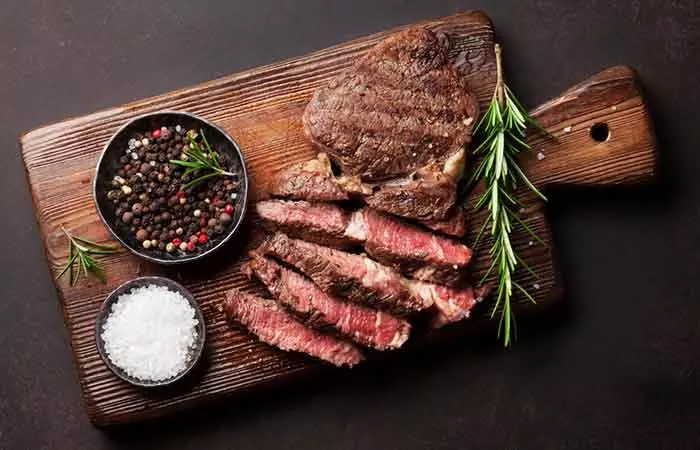
Ingredients
- 1 ribeye steak
- Salt and pepper to taste
Prep Time:
10 minutes
How To Prepare
- Season the ribeye steak with salt and freshly ground pepper on both sides.
- Heat a non-stick pan on high heat.
- Sear the steak for about 3-4 minutes (adjust as per the preferred level of doneness) on both sides.
- Slice and serve.
2. Salt And Pepper Lamb Chops

Ingredients
- 4 lamb chops
- Salt and pepper to taste
Prep Time:
10 minutes
How To Prepare
- Season the lamb chops with salt and freshly ground pepper on both sides.
- Preheat a grill, skillet, or pan on medium-high heat.
- Sear or grill the lamb chops for about 3-4 minutes (adjust as per the preferred level of doneness) on each side.
- Allow to rest before serving.
3. Stir-Fried Ground Beef
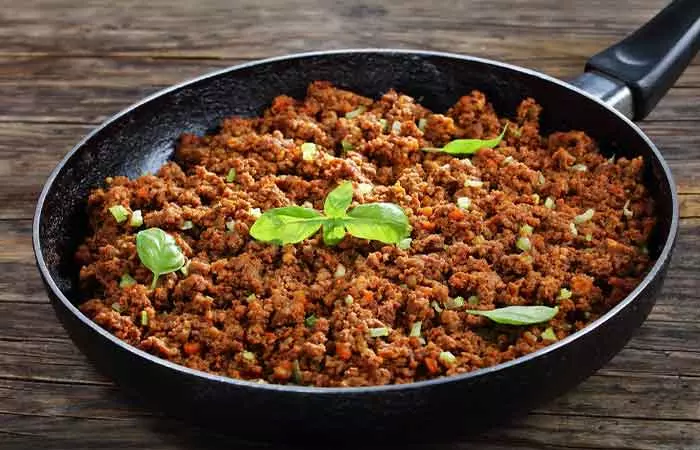
Ingredients
- ½ pound ground beef
- Salt and pepper to taste
Prep Time:
15 minutes
How To Prepare
- Heat a skillet or pan over medium-high heat.
- Add the ground beef to it and break it apart with a spatula.
- Season with salt and pepper and stir well to mix.
- Cook until the meat has a brown glaze and is thoroughly cooked.
- Serve it smoking hot.
4. Ribeye Steak Salad (For Those Without Vegetable Allergies)
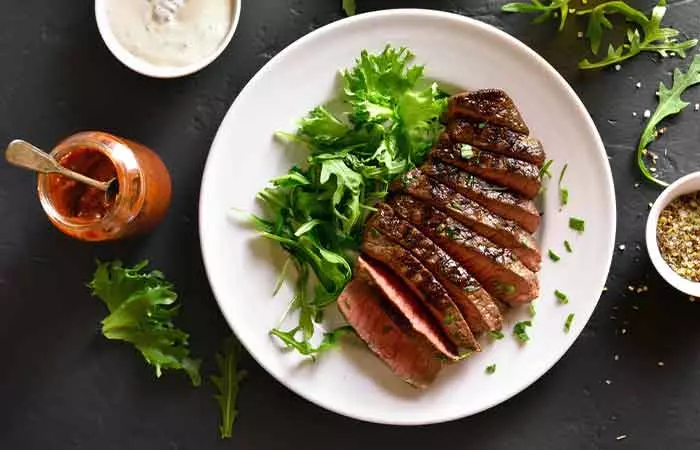
Ingredients
- 1 ribeye steak (cow or bison)
- Salt and pepper to taste
- A cup of mixed greens (like spinach, mustard greens, lettuce, etc.)
Prep Time:
20 minutes
How To Prepare
- Season the steak with salt and pepper on both sides.
- Preheat a grill or skillet on high heat.
- Grill or sear the steak for about 3-4 minutes (adjust as per the preferred level of doneness) on each side.
- Allow it to cool for a few minutes before slicing.
- Serve it with 1 cup of mixed greens.
 Pro Tip
Pro TipThis diet can certainly alleviate food allergy symptoms if the specific allergen responsible for it is avoided. However, removing whole food groups from your diet can have potential side effects on your body. Let’s learn more about the negative health implications of the lion diet.
Side Effects Of The Lion Diet
As the diet largely lacks necessary nutrients and calorie intake, there are several side effects associated with it.
- May lead to nutrient deficiencies due to prolonged restrictions on essential nutrients from fruits, vegetables, and whole grains (10).
- May induce ketosis due to high-fat and low-carb consumption. This may lead to related side effects like keto flu, characterized by nausea, headaches, and fatigue.
- May negatively impact or alter the gut microbiome due to the elimination of plant-based foods that contribute to its sustenance.
- May cause dehydration as the daily additional hydration from fluids and water-rich foods is eliminated.
- May have severe negative health implications such as colorectal cancer due to the high consumption of red meat and salt (11).
- May contribute to disordered eating due to the restrictive nature of this diet.
- May have negative psychological effects because of the extreme restrictions, which may result in anxiety or stress about food choices.
- May cause other unknown long-term health risks due to its restrictive nature.
Infographic: All You Need To Know About The Lion Diet
Although the lion diet has no foundation in science and medicine, several advocates of the diet swear by its effectiveness. People with multiple food sensitivities find ruminant meats to bring much-needed comfort to their digestive system. So far, the diet seems to have its fair share of merits and demerits. We have summarized all the key points about it in an engaging infographic below for your convenient reference. Take a look.

Illustration: StyleCraze Design Team
In conclusion, the lion diet is an exceedingly restrictive diet that intends to help people identify the root sources of their food sensitivities. It focuses on an exclusive diet of ruminant meat, salt, and water. Although the diet has some health benefits such as improved digestive health, mental health, and relief from food allergies, this diet is not backed by scientific research. It excludes multiple vital nutrients from the diet and may lead to nutrient deficiencies. Additionally, the weight loss incurred due to abstinence from essential calories may actually be unhealthy and lead to reverse weight gain in the long run. Therefore, it is important to consult a professional nutritionist or dietician to understand the implications of this diet for your health conditions and goals.
Frequently Asked Questions
What is the difference between the lion diet and the carnivore diet?
Both Lion and Carnivore diets are restrictive meat-based diets. However, the Lion diet is much more restrictive, as it only allows the consumption of ruminant meat, salt, and water, excluding all other types of meat and animal-based foods generally used in different Carnivore diet recipes.
How long does the lion diet take to work?
The results of the Lion diet may vary depending on the individual and their special health conditions and food sensitivities. It may take several weeks to notice a visible reduction in food allergy symptoms.
Can you drink alcohol on the lion diet?
No. The Lion diet does not allow any drinks or beverages except water. The less strict versions of the diet also discourage drinking alcohol due to its negative impact on health. It adds carbs and calories that the diet is trying to avoid and it may also lead to dehydration as it is a diuretic.
Can you have coffee on the lion diet?
No. As any fluids besides water are not allowed on the Lion diet, coffee is also excluded. Additionally, consuming coffee while on the Lion diet may lead to dehydration as it is a diuretic and it may also cause potential allergies due to its caffeine and other bioactive content.
Can you use spices in a lion diet?
There are variations of the Lion diet that allow the use of spices and diverse seasonings in the meals. The idea behind their exclusion is that they may be potential allergens, triggering food sensitivities. Therefore, as long as you are not allergic to the spices, you may use them in moderation while on the lion diet.
Illustration: Lion Diet Guide: Benefits Meal Plan And Side Effects
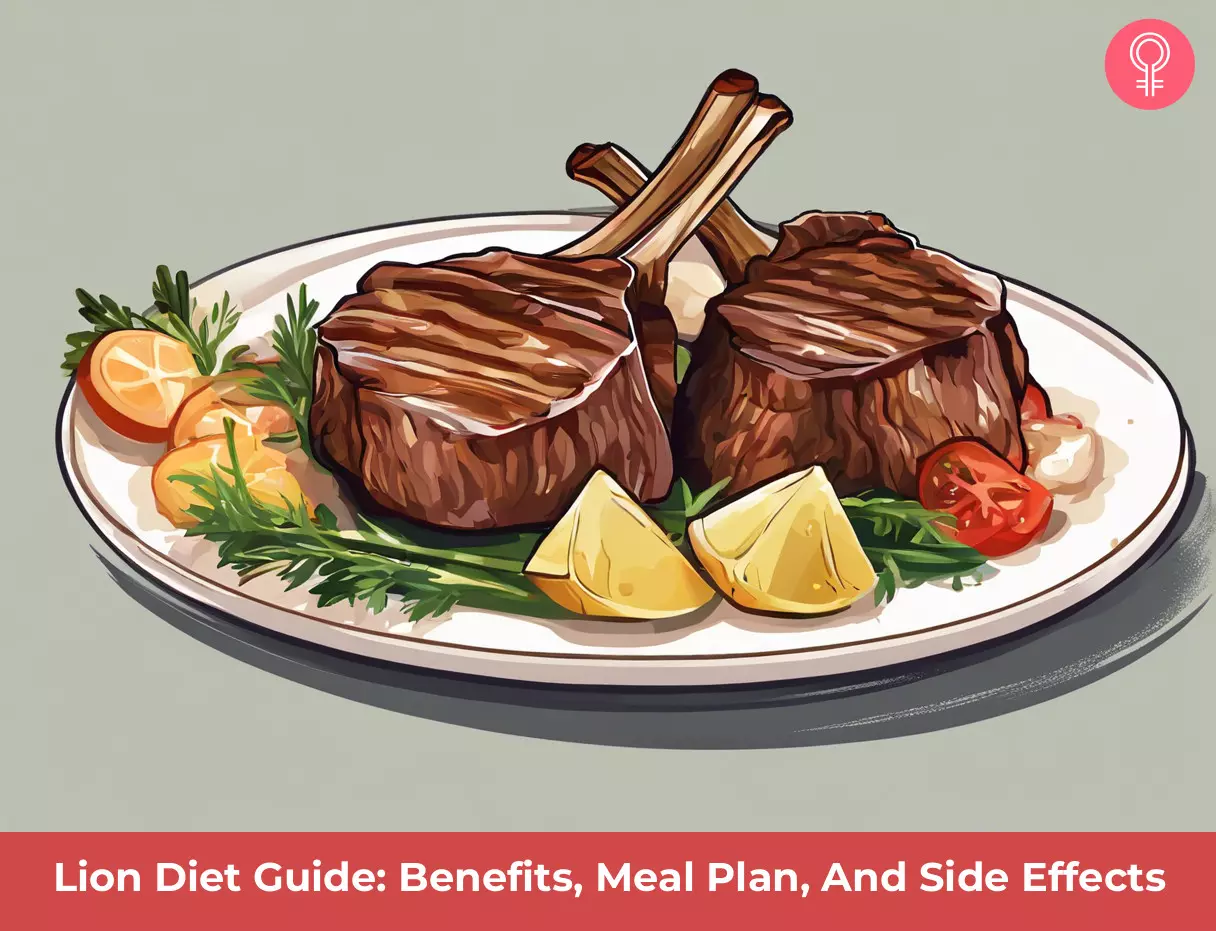
Image: Stable Diffusion/StyleCraze Design Team
The viral lion diet seems to have many benefits but this ultra-restrictive diet is not easy. Check out the following video for a reviewer’s experience of being on the diet for 72 hours.
References
Articles on StyleCraze are backed by verified information from peer-reviewed and academic research papers, reputed organizations, research institutions, and medical associations to ensure accuracy and relevance. Read our editorial policy to learn more.
- Bioactivity and health effects of ruminant meat lipids. Invited Review
https://pubmed.ncbi.nlm.nih.gov/32272342/ - Role of the elimination diet in adults with food allergy
https://pubmed.ncbi.nlm.nih.gov/2794292/ - Impact of Diet on Symptoms of the Irritable Bowel Syndrome
https://pubmed.ncbi.nlm.nih.gov/33572262/ - The Effects of a Beef-Based Meal Compared to a Calorie Matched Bean-Based Meal on Appetite and Food Intake
https://pubmed.ncbi.nlm.nih.gov/26270740/ - Impact of Beef and Beef Product Intake on Cognition in Children and Young Adults: A Systematic Review
https://www.ncbi.nlm.nih.gov/pmc/articles/PMC6722791/ - Low-Carbohydrate Diet
https://www.ncbi.nlm.nih.gov/books/NBK537084/ - Reducing Calorie Intake May Not Help You Lose Body Weight
https://www.ncbi.nlm.nih.gov/pmc/articles/PMC5639963/ - A review of issues of dietary protein intake in humans
https://pubmed.ncbi.nlm.nih.gov/16779921/ - Vitamin A and Carotenoids
https://ods.od.nih.gov/factsheets/VitaminA-Consumer/ - Nutrient Intake and Status in Adults Consuming Plant-Based Diets Compared to Meat-Eaters: A Systematic Review
https://www.ncbi.nlm.nih.gov/pmc/articles/PMC8746448/ - Red Meat and Colorectal Cancer
https://www.ncbi.nlm.nih.gov/pmc/articles/PMC4698595/
Read full bio of Reema Pillai
Read full bio of Payal Karnik
Read full bio of Arshiya Syeda
Read full bio of Aparna Mallampalli






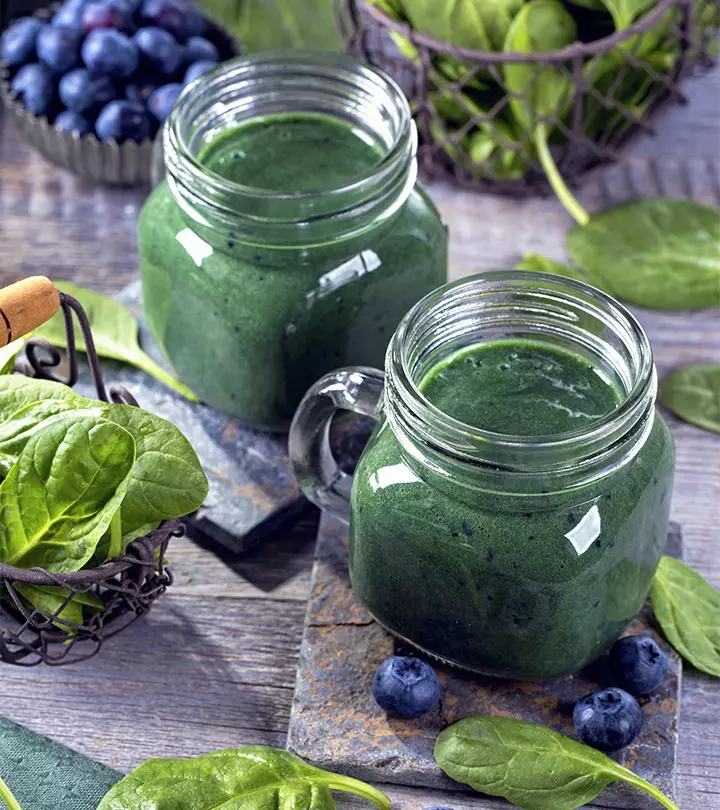

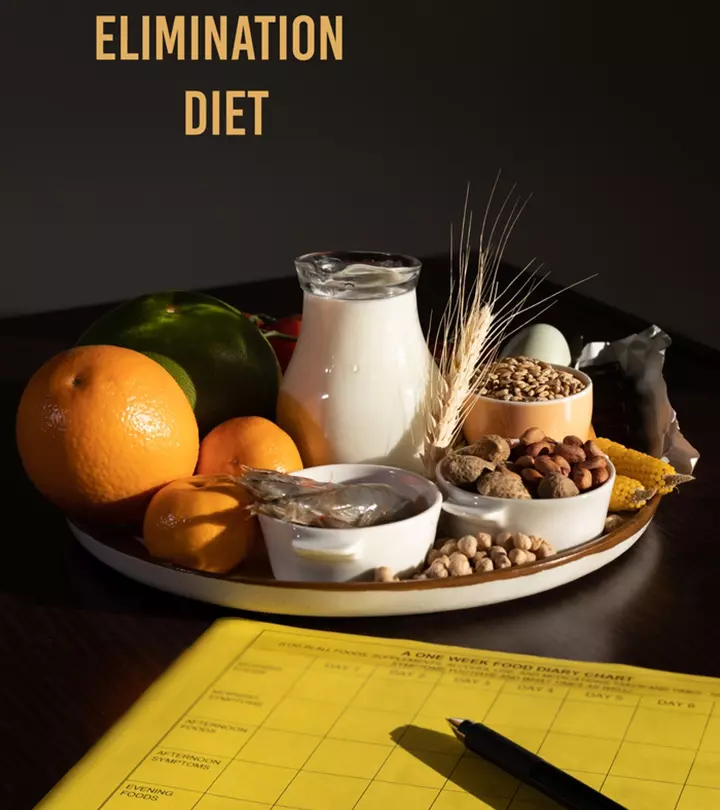











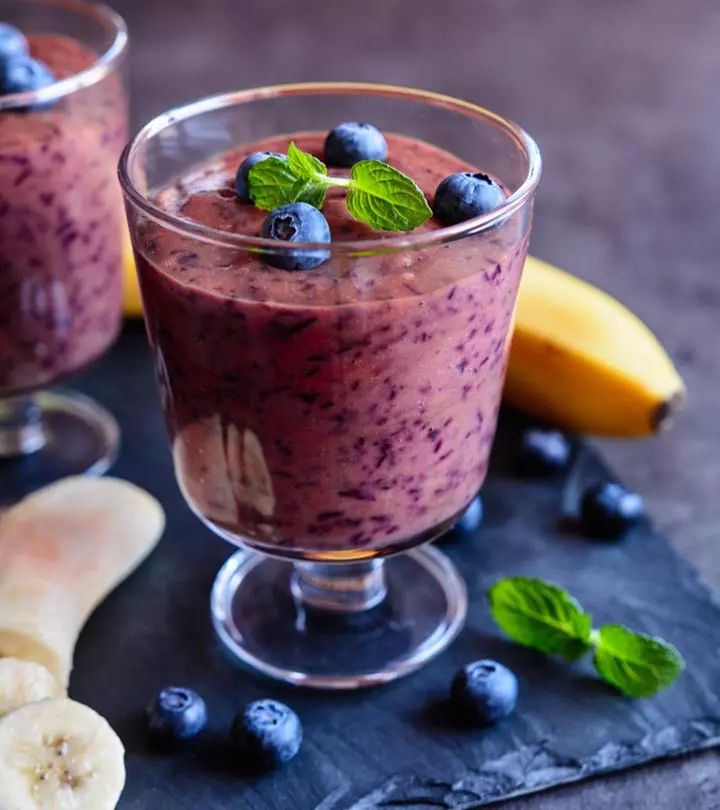






Community Experiences
Join the conversation and become a part of our empowering community! Share your stories, experiences, and insights to connect with other beauty, lifestyle, and health enthusiasts.